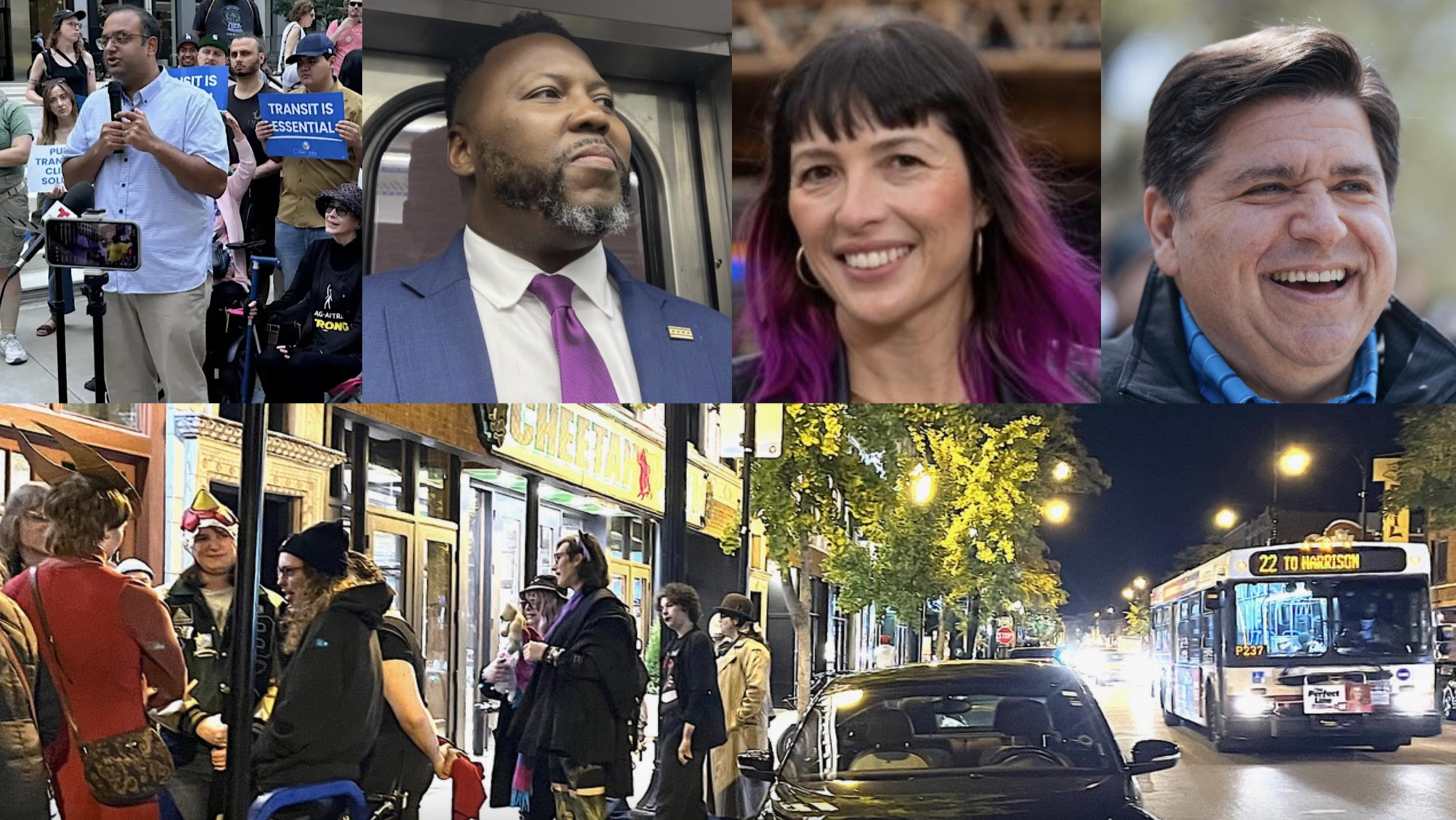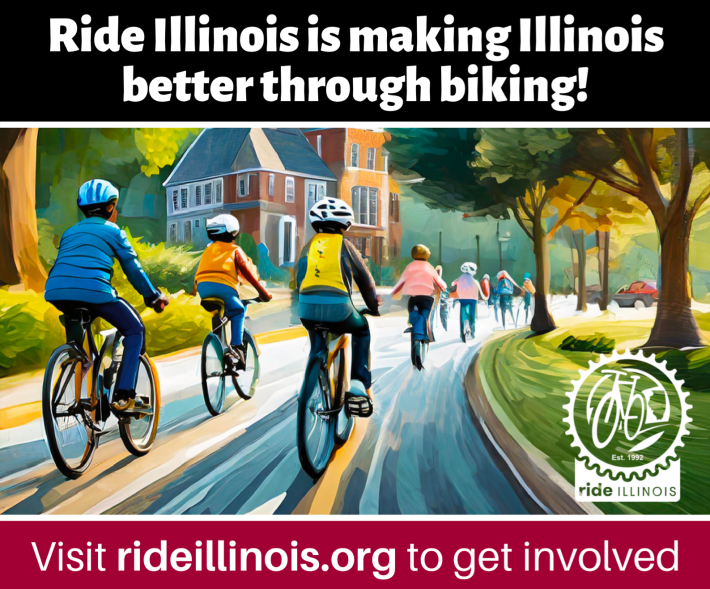
Update Friday 10/31/25, 9:00 AM: It was scary when the Illinois General Assembly floor debate over transit legislation entered the Halloween witching hours. But thankfully it looks like we've avoided a "Nightmare on Second Street" (the roadway where the state capitol is located). Here are some features of the new legislation that passed with $1.5 billion for public transportation, raised without statewide taxes, which I gleaned from a report by Capitol News Illinois and a summary by Capitol Fax.
• The plan would raise a projected $860 million gas and diesel sales tax money, as well as $200 million in Road Fund interest, to bankroll transit operations, largely in Chicagoland.
• It doesn't include several controversial proposed statewide surcharges and fees, such as the "Burrito Taxi Tax" for restaurant and retail deliveries; and a $5 price increase on large concerts and other events.
• The proposal also omits the recently pitched "billionaire's tax." See discussion of this proposal below in our recent interview with Rep. Kam Buckner.)
• Chicagolanders would chip in through higher toll charges, and a 0.25 percent increase in the Regional Transportation Authority sales tax.
• In exchange for paying less, Downstaters would only get $129 million for their transit systems, less than the originally planned $200 million. But reportedly, transit officials from other parts of the Land of Lincoln had previously said they they could use more cash, but didn't actually request that much money.
This outcome surely isn't going to please absolutely everyone. The legislators seemed to have swiftly come up with a solution that will provide robust funding for Chicagoland without too many people feeling it's a Halloween horror show.
More on the subject later today...
Update: Thursday 10/30/25, 8:15 PM: This evening, Streetsblog is occasionally making the rounds of other publications, some of which have reporters at the state capitol, for updates on the transit bill sausage-making process. We're agreggating these on our Twitter and Bluesky accounts. Let's keep our fingers crossed that they pass legislation before our rail carriages turn into pumpkins!
Update: Thursday 10/30/25, 12:30 PM: Streetsblog just received the following statement from Rep. Kam Buckner, co-sponsor of the House transit reform/funding bill. He says the reports of his legislation's death have been greatly exaggerated.
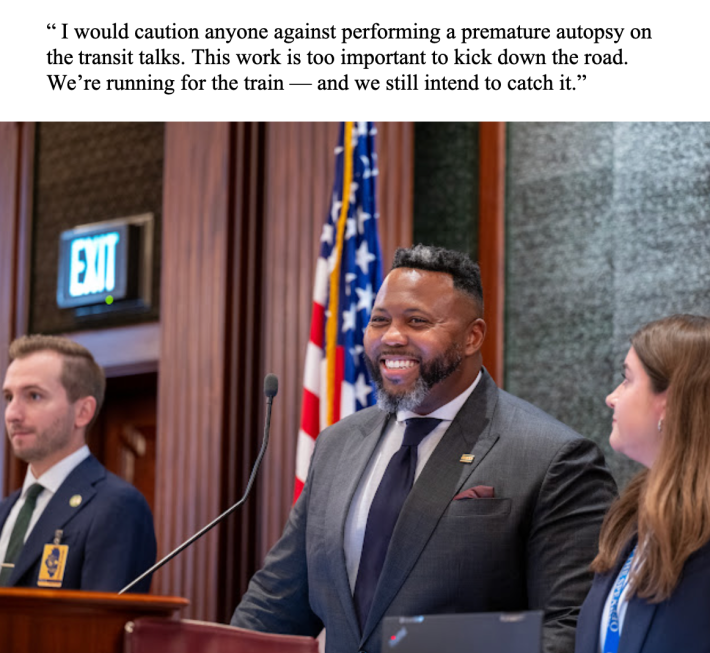
Last May 31, the Illinois Senate passed the transit reform and funding bill HB 3438 in the literal eleventh hour of the spring legislative session, but the House didn't bring the legislation to a vote. As a result, Chicagoland still faced a transit fiscal cliff in 2026 that would require major service cuts and layoffs if revenue wasn't raised this year.
In early August, when House Speaker Emanuel "Chris" Welch spoke with Streetsblog about his chamber's efforts to research and write complementary legislation, he indicated that patience was the watchword. "[Representatives] Eva-Dina Delgado and Kam Buckner are doing a heck of a job leading the [the House's Public Transit Working Group,]" he said. "We will give [the Senate] a counter-proposal when we give them a counter-proposal."
That last bit reminded me of this vintage Paul Masson wine ad featuring actor Orson Welles, who lived for a time in Metra-served Woodstock, IL. The slogan was, "We will sell no wine before its time."
Since the General Assembly's fall veto session ends tomorrow, it's fortunate that yesterday Welch, Delgado, Buckner, and their House colleagues felt the time was ripe to uncork their legislative libation. On Tuesday, they announced the measure SB 2111, and it appears to be a bracing concoction.
Thankfully, the new bill maintains the Senate's goal of raising $1.5 billion for the CTA, Pace, and Metra annually, which the agencies and advocates were pushing for, as a strategy to not just save local transit, but upgrade it. Granted, it eliminates some of the revenue sources from HB 3438 that Streetsblog endorsed, including surcharges on car-based transportation. Let's pour out a bottle of salsa for the proposed $1.50 "Burrito Taxi Tax" (SBC's words) on restaurant and retail deliveries, which Welch said was "dead on arrival." Poor little guy.
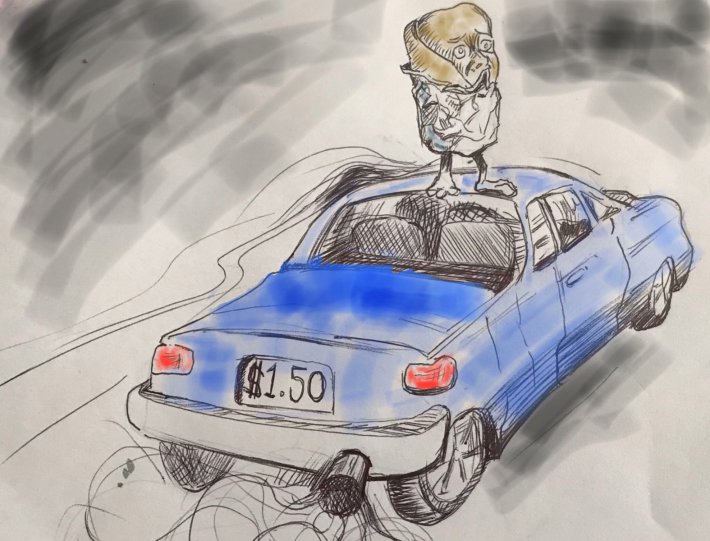
But the new proposal has a lot of other interesting revenue ideas that the House believes will be more palatable to Illinoisans. Today just before 3 p.m., Streetsblog caught up with Buckner for a quick interview about the nitty gritty of the bill, its chances for success, and what he thinks about pushback from the tax-phobic right-wing think tank lIlinois Policy Institute.
John Greenfield: Your bill has passed in House Executive Committee. So what are the next steps?
Rep. Kam Buckner: It now goes to the floor of the House, and our intention is to take a full House vote on it. Literally in about six minutes we should be gaveling it. It will be read a second time, and then a third time, and then we will try to vote on it today.
JG: And then it would go over to the Senate?
RKB: Yes sir.
JG: And you getting the impression that the Senate doesn't have a problem with what you're proposing? At least [HB 3438 sponsor Sen. Ram] Villivalam is on board with it?
RKB: The tenets of our bill are very much aligned with what the Senate did. The transit governance structure is pretty much intact. I literally just left a meeting with them and the Governor's Office about this, and I'm still convinced that we can move on this, and this is something they can get behind.
Transit advocates from Better Streets Chicago and Abundant Housing Illinois showed up to the capitol in costume to urge legislators to get the funding train into the station.
JG: Are you pretty confident you've got a 60 percent supermajority [the vote required for legislation passed during the veto session that would take effect immediately] in the House?
RKB: I am confident that we will have, yeah, the requisite number of votes, based on conversations we've had with some of our members. There may have to be an impending limit, but I think we're in a good spot.
JG: Are any of the transit-friendly Republicans in the House on board with us?
RKB: We'll see. Rep. [Brad] Stephens was a part of working group, and part of the revenue conversation. Some of that even came from him. So I would hope that when the bill goes up on the board, that it will be bipartisan, because this is a bipartisan issue.
JG: Now HB 3438 includes a few different driving-related surcharges, including a 10 percent fee on Uber and Lyft rides, the $1.50 delivery fee, and a 50 cent increase on tolls. Or at least they wanted to have the toll increase, but [road builders union] Local 150 was dead-set against it, so it got dropped.
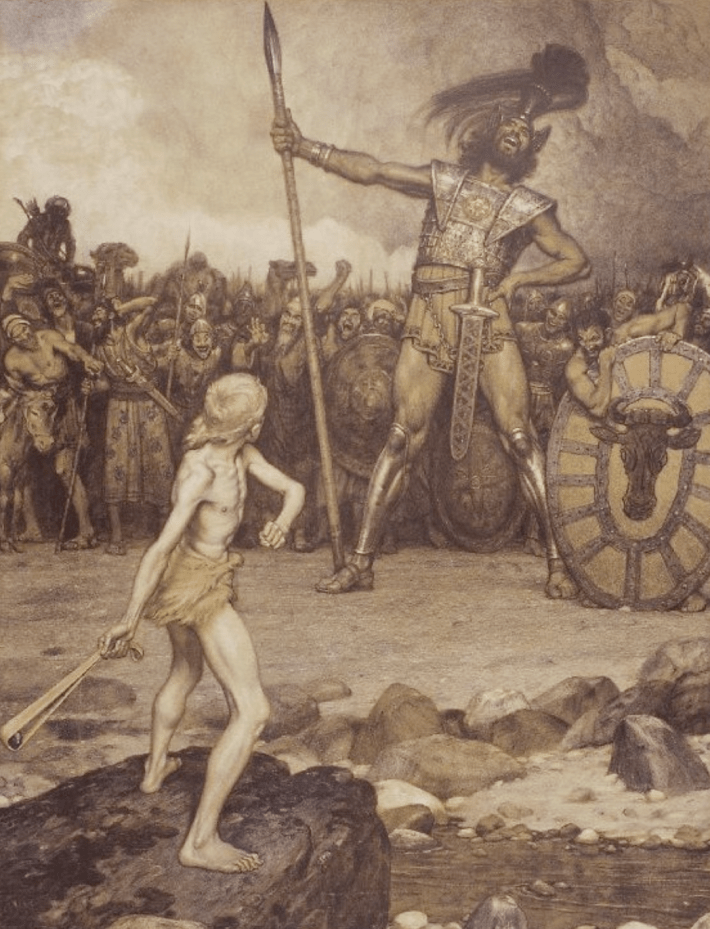
So your bill does not include any of this stuff, does it?
RKB: It does not.
JG: What was your reasoning with getting rid of the driver-related surcharges?
RKB: In a perfect world, there will be a clear nexus between transportation and the revenue that we proposed. But we've got 78 members [in the House Democratic Caucus] all of whom were talking to folks in their districts over the summer, knocking on doors and asking people what was important to them. The delivery tax in particular, as well as some of the other ones, just did not get a warm reception.
We polled our folks a number of times, both the working group and the leadership, and the whole Democratic Caucus. The things that we have presented got the most support from the members of the caucus.
Obviously, there's more than one way to skin a cat. There are a few ways to get to that revenue number. We wanted to take our time and be methodical and precise, and learn from what the Senate did in May. We wanted to see if we could come up with a more feasible way to get there. And we thought that this was a more feasible way.
JG: All right. One thing that seems like a game-changer in what you're proposing is the so called "billionaire tax." I was under the impression that the reason why what was proposed by the Senate does involve different surcharges and fees on everyone, is that it's considered politically risky to try to have any taxes that are going to single out ultra-wealthy people more money. Governor Pritzker didn't have any have any luck passing a graduated income tax, which would have taxed more affluent Illinoisans at a higher rate that middle-class residents.
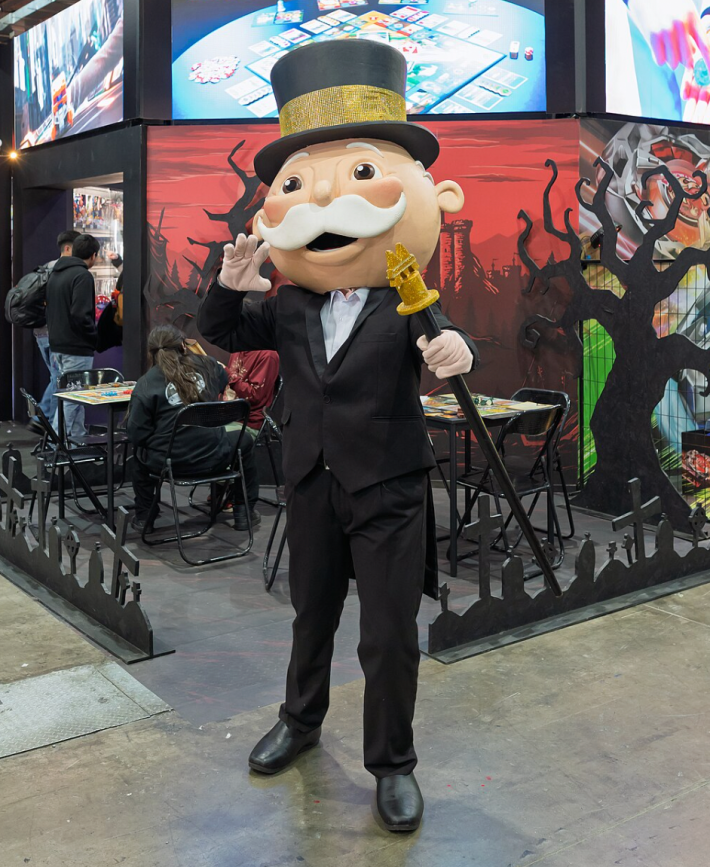
Obviously, the governor is a billionaire himself. Was this something that his office supported?
RKB: Every revenue proposal that we put into this package was shared with the Governor's Office. We've had a number of meetings over the last year and a half with them, and some may say we met ad nauseum. [Laughs.]
But obviously, sometimes things feel different and look different when you see them on paper. None of these taxes were things that should surprise anyone who has been working on this issue.
And we had a committee meeting hearing today, and the Governor's Office did not slip in opposition or testify against it. And so I think we are still in a position where we can find a way to agree on whatever the final version is.
JG: So your proposal includes a 7 percent amusement tax on streaming, a $5 surcharge on large events, and allows more suburban speed cameras, plus the billionaire's tax, with a 4.95 percent tax on unrealized gains.
Have you checked out any of the Illinois Policy articles recently? Basically, they want all the governance reforms that are in HB 3438, in terms of better management of the three agencies, better public safety, better coordination of between service, and saving money on capital expenses. But they are opposed to raising any money to do any of that stuff. Any reaction to that attitude?
RKB: Yeah John, everybody wants to go to heaven, but nobody wants to die.
JG: [Laughs.]
RKB: You can't create the system that we deserve by hoping and wishing that you get to a point where things are moving in right direction. You've got to actually do something about it. And so we're trying to do it. And I'll let folks pontificate about the ways to get there, but we're actually, we're the man in the arena right now, we're not just talking about it.
JG: Well, it seems like that might be a good place to wrap things up. Anything else you want to say?
RKB: I think it's all good. Thank you for covering this.
JG: Well thanks for taking the time to talk. I know it's a busy day for you.
Frustratingly, shortly after our interview, Capitol News Illinois reported that Governor JB Pritzker voiced opposition to some of SB 2111's revenue sources at an event this morning. "There’s got to be a lot of discussion between the House and the Senate in order to come up with a final bill because it isn’t going to look like what the House has put forward," the potential presidential candidate said.
So it appears that Buckner and his allies need to go back to the drawing board in order to get a transit bill passed tomorrow. It seems like a challenging situation, but let's keep our fingers crossed that they can make this happen. Otherwise, the future of Chicagoland transit will not be bright.
Rep. Kam Buckner is a former football player. So clearly this situation requires a pep talk from a football coach with a metaphor about what it's going to take to get this legislation into the end zone. Where's Tim Walz when you need him?

Do you appreciate Streetsblog Chicago's paywall-free sustainable transportation reporting and advocacy? We officially ended our 2024-25 fund drive in July, but we still currently need $42.5K to complete our budget and keep publishing at full strength in 2026. We'd appreciate any leads on potential major donors or grants. And if you haven't already, please consider making a tax-deductible donation to help us continue publishing next year. Thanks!
